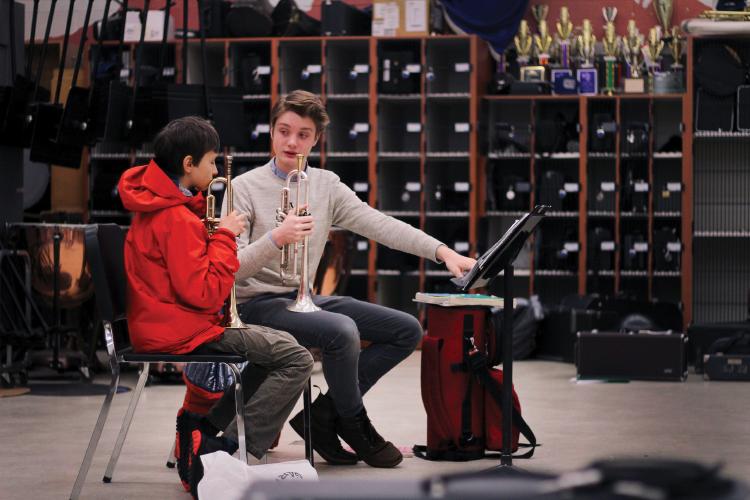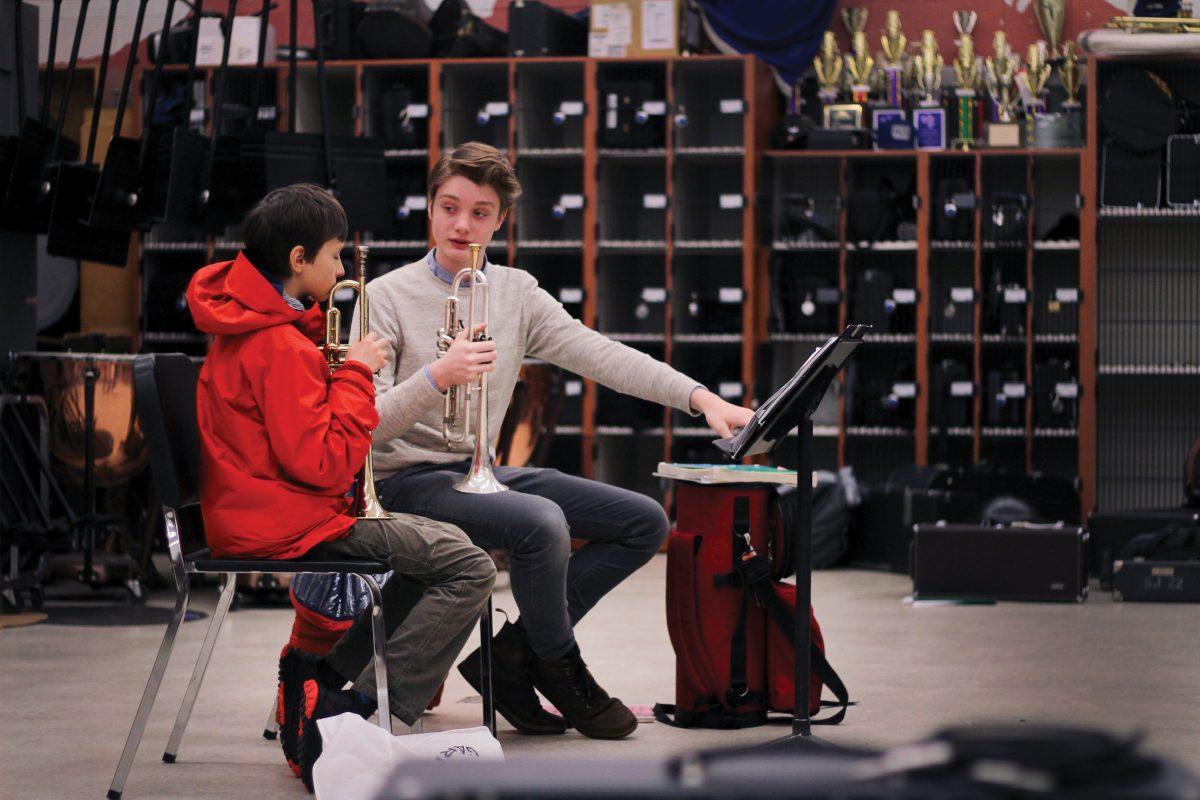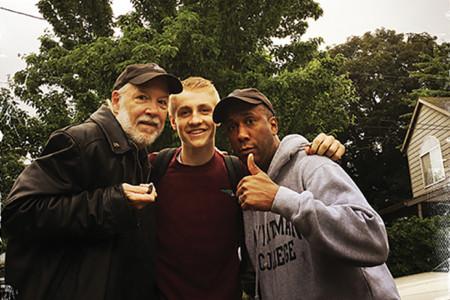Michail Thompson stands on a brightly lit stage at Mississippi Studios in North Portland. Radio Host Luke Burbank is seated on a stool to his right. Thompson’s silver trumpet shines in the spotlight as he picks up the instrument at the comedy show. Without hesitation, the then-Grant sophomore plays a few measures of the “Transformers” theme song.
The room fills with the sounds of a smooth melody as Thompson’s fingers dance across the valves. When he finishes, the packed audience beyond the stage erupts in applause.
“How much of that can you teach me in the next 90 seconds?” Burbank asks. Laughter ensues. For the next few minutes, Thompson jokingly attempts to teach the novice a song he had only learned the night before.
Although part of a comedic segment, Thompson’s appearance on Live Wire Radio last year reinforced his love for music. “There is a correlation to the different ways music can affect people,” he says today. “I thought that was important and really cool to be in a different situation.”
Now a junior, Thompson has been an avid trumpet player since age 7. As a second grader, he jumped at the opportunity to take lessons and immediately fell in love.
“Everybody has their own way of expressing themselves, and I feel like this is mine,” he says. “I just liked the complexity of it, and yet, it’s so simple.”
Through joining numerous competitive bands in his adolescence, Thompson began to pave a path to a career as a professional. His dedication and raw talent separated him from the crowd.
“Seeing him run sectionals – either Wind Ensemble or Jazz Ensemble – kind of shows just where his musical brain is at,” says Grant’s Band Director, Brian McFadden.
For Thompson, musical communities like those at Grant have been the backbone to his success, and now he wants to share that experience.
Earlier this year, Thompson established a mentorship program with fellow musicians at Grant for Beaumont Middle School band students. “If I can help them in any way towards their goal … that’s what I want to do,” he says.
Born April 15, 2000, Thompson lived his first three years in Portland with his parents, Jim Thompson and Katarina Svetlova, who are both professional ballet dancers. Thompson’s grandparents are opera singers, so he was exposed to performing arts from an early age.
The family moved to Düsseldorf, Germany after Svetlova accepted a job offer there. Thompson attended school for four years in the new country. His parents had spoken to him in German since birth, so he was already almost fluent in the language. Fitting in wasn’t difficult.
In Germany, he began piano lessons required by his school – his first emergence into the music world. Adapting to the slow-paced German lifestyle and being an only child prompted Thompson to learn how to entertain himself. “I feel that … having that internal drive affected me later on in music because I didn’t need anyone else telling me what to do,” he says.
After his younger brother, Torsten, was born in 2007, the family moved back to the United States. Thompson, at his parents’ urging, took a year of ballet lessons at the Oregon Ballet Theater.
Despite Thompson attending more than 75 of his parents’ shows and performing in his own, his heart was in music. “He didn’t really take to dance. We thought with two dancers, you know, we’d have a dancer in tow,” his mother says.
Instead, Thompson was attracted to the pit orchestra below the stage. “It was just so clear and brilliant, while having such powerful control,” he recalls. He immediately knew that he wanted to imitate that sound.
When he got to choose a prop for his part in a party scene of “The Nutcracker,” Thompson instinctively chose the trumpet. Though the cheap, plastic, mini-trumpet was nothing like a real one, it established an interest in the young Thompson.
Svetlova remembers thinking, “What? Trumpet? It’s like the noisy thing in the orchestra pit? Why do you want to play the trumpet?” But Thompson was persistent, and his family looked into lessons for him.
For the Christmas of 2007, Thompson was gifted a cornet, which is virtually identical to a trumpet, from his parents. “That’s what I worked on,” he says. “From that moment, I knew that that’s what I wanted to do.”
He struggled with the instrument initially but refused to give up. “It was just a piece of metal that sounded really bad at first,” he says. “But I kept doing it just because it was that way to express myself, and I was having fun.”
Thompson made the switch to trumpet in fourth grade, around the time his sister, Alexandra, was born, and began to improve rapidly. A year later, he earned a spot in the Portland Youth Wind Ensemble, a branch of the Portland Youth Philharmonic. Joining the prestigious youth orchestra as an elementary school student is a rarity.
The philharmonic had a mentor program and Tree Palmedo, a former Lincoln High School student, helped guide Thompson through his first years in the orchestra. Palmedo, who is now finishing his master’s degree at the New England Conservatory of Music in Boston, Mass., remembers Thompson’s unique musical ability.
“Of the people I was able to teach back when I was in high school, he was definitely one of the most gifted and dedicated musicians,” says Palmedo.
Thompson looked up to his mentor. “He gave me an image that I could look forward to – this is what I could become if I work hard and follow this dream,” he says.
As a student at Beaumont Middle School, Thompson joined the competitive Ambassadors Band and created his own combo group with his friends. He remained the principal trumpet player all three years of middle school.
Beaumont was where Thompson realized that trumpet was his calling. “I had already figured out what I wanted to do, what I was interested in. Everybody else was still looking,” he says. He surrounded himself with friends who shared his passions and spent his time practicing with them.
Cynthia Plank, the Beaumont band director, worked with Thompson for six years before he entered high school. “Michail has a steady determination that is balanced by a sensitive ear and an open-minded approach to instruction,” she says of his talent. “Many other students have one of these qualities, but it is amazing to see them all in one player.”
But despite his success, Thompson found it hard to be a band student in middle school. “I just had to walk through the school with a music stand, and I felt like I was being judged just for being a musician,” he says. “There’s like the classic band nerd, you get put in a category when you’re in band.”
Regardless, Thompson persisted. He recalls dedicating extra hours each day at home to practicing the trumpet.

At school and in the youth philharmonic, Thompson was often put in a teaching role. “Because he was so successful at such an early age, I think it was easy for others to be a little envious. But his kind nature and obvious talent made it hard for anyone to see him as anything other than an inspiration,” remembers Plank.
And as a freshman at Grant, Thompson was asked to become a mentor himself. He immediately agreed.
“It’s a great feeling that you can walk away at the end of a lesson saying, ‘I made a difference,’” he says. “The best experience is when you tell them to practice something, and they come back, and it’s been practiced, because that means that they value your opinion and respect you as a musician.”
Carolyn Talarr, the community programs director at the youth philharmonic, emphasizes the benefits for both students involved with the program. “It’s a win-win because as mentees, young musicians get to test the water of serious engagement with instrumental music without committing to a major recurring expense,” she says. “And as mentors, more accomplished musicians get their teaching experience in a supportive, low-stress atmosphere.”
While Thompson continues to play in the Portland Youth Philharmonic as lead trumpet, Grant band has assumed a significant role in his life. “Music, more than a lot of things, is a community … people talk a lot about ‘band family,’ and I feel like that’s a great thing at Grant,” he says.
His freshman year, Thompson became the principal chair in Wind Ensemble and played first chair parts in Jazz Ensemble, which he joined halfway through the year. This year, he was elected band council president.
“There’s a work ethic and dedication in him that isn’t necessarily found in every single high schooler. He has a focus level that you would see in a college music major,” says McFadden. “That’s kind of a rare thing to find in a student who is 16 years old.”
Thompson takes advantage of breaks in his demanding schedule to fit in additional practice. He dedicates a few lunches a week to practicing his instrument in the band room. “I feel like you should be dedicated to your dream 100 percent. That’s the only way you’re going to get there,” says Thompson.
Thompson’s dedication expands past self-improvement. He sees it as his responsibility to strengthen the band program’s future generations. To make his mark, Thompson decided to establish a mentorship program between band students at Grant and Beaumont.
His goal is to give students a role model to look up to. “I just wanted to help people be more inspired,” he says.
Thompson approached McFadden with the idea and formed a group of 18 mentors to kick-start the program. As volunteers, Grant students help expose middle schoolers unable to afford professional lessons to a higher level of music. It also gets young musicians eager to become members of the Grant band community.
“You sort of see a lot of your teachers as authority figures, or inaccessible, or not cool I guess,” says Palmedo. “Having someone that’s closer to your age but is really invested in what they’re doing and passionate about it has sort of a … window into what a person in high school or middle school could be interested in, in music.”
The mentorship program is free, and Thompson wants to be able to provide a unique opportunity for disadvantaged young musicians.
“I think it opens up a lot of doors for students who couldn’t afford them … there’s a lot of people in this particular neighborhood that have the benefit of having money to pay for lessons,” says McFadden, who has been helping Thompson get the program running.

On a recent Wednesday afternoon, Thompson and Beaumont sixth grader Tovi Green sit side by side in the small space above the Grant band room. After thumbing through the mentee’s music book, Thompson stops on a page and sets the book on the music stand. The two play a duet arrangement of the “Imperial March” from Star Wars, and the metallic sound of the instruments fills the cramped room.
Green is Thompson’s first pupil under the new program. The middle schooler found out about the program through an email sent out by Plank to Beaumont families. Green, who just started playing the trumpet in fall of 2016, is eager to learn more.
Thompson remains patient. When something needs to be improved, he offers words of encouragement and shows Green the correct method. And he doesn’t just focus on the notes. He checks Green’s posture and breathing, letting him know it can affect the way things sound.
Green says that getting help makes a difference in his playing. The mentor program was something he was looking forward to. “I was excited,” he says. “And yeah, a little nervous, too.”
Thompson sees this as coming full circle. “Knowing that (having a mentor) affected me in such an important way, if I can give that to other kids, that’s what life is about – sharing information to the next generation,” he says. ◆





























![Artita-Guerrero knows that she will always remember her mom, but as she grows older her memories become less pronounced. “It’s the smaller things I wish I could remember but can’t,” she says.“So many other thing have happened in my life that I’m kinda like covering...[her death].”](https://grantmagazine.com/wp-content/uploads/2017/02/DSC_5574-copy-copy.jpg)



